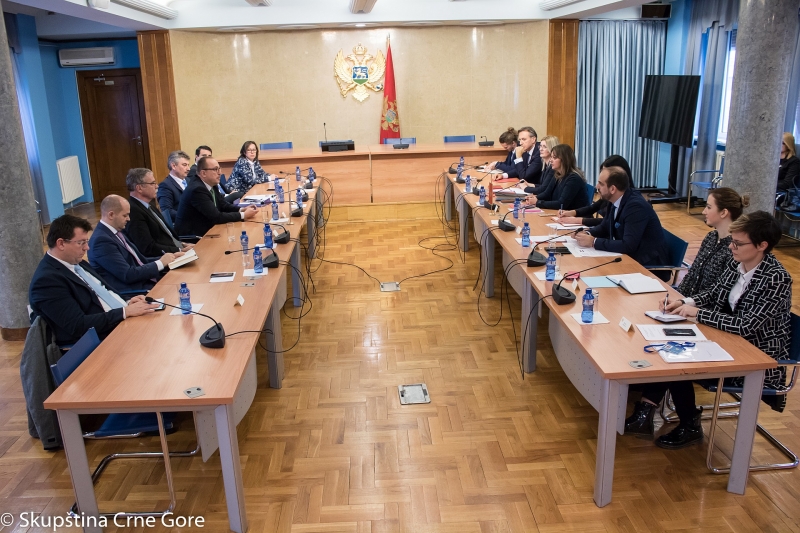Today’s meeting of the Committee on European Integration of the Parliament of Montenegro with the Chairperson and members of the Committee on Foreign Affairs of the National Assembly of Hungary was marked by the discussion on the pace of Montenegro’s integration to the EU, but also the current challenges at the level of the Union itself.
The delegation of the Committee on European Integration in the following composition: Ms Sanja Pavićević, Mr Momčilo Martinović, and Mr Ranko Krivokapić, headed by Ms Daliborka Pejović, MP, has met with the Hungarian parliamentarians, within their official visit to Montenegro. The Committee member Mr Daliborka Pejović pointed out that, despite current political challenges, there was a general consensus and partisan support with regard to Montenegro’s EU accession process. However, she added that the process as such was taking a long time and that it was difficult to maintain enthusiasm of citizens as it was in the first years of negotiations. She also informed the interlocutors about the current pace of negotiations, stating that there was only one more chapter remaining to be opened, Chapter 8 - Competition. Assessing the negotiation process, Ms Pejović said that it meant constant discussion on reform processes in a society, and in that sense she pointed out how parliamentary cooperation between candidate countries and EU member states was significant for further progress in negotiations.
Chairperson of the Committee on Foreign Affairs of the National Assembly of Hungary Mr Zsolt Németh voiced his pleasure about the long-term cooperation between the two parliaments and dedicated his contribution to the current developments at the level of the Union itself. In that respect, he emphasised that there were states in the EU which did not support the enlargement policy, and that Hungary belonged to the countries seeing enlargement as part of the solution to internal challenges faced by the EU. He invited his Montenegrin colleagues to actively participate in promoting the enlargement policy, while pointing out that Montenegro, as an important factor of stability, may contribute to the integration of the entire region. Answering the question by MP Pejović how much was the topic of the enlargement policy present in the EP campaign for elections in May, Mr Nemet said that the EU enlargement would not be a main topic in the future composition of the Parliament, but he expected the situation to change after the next parliamentary election.
The interlocutors agreed that the exchange of expertise and experiences between parliaments was especially important for the accession period, as well as that the countries which did not have to reach consensus on foreign policy goals were much more stable. They also discussed the significance of expert support on climate change, human and minority rights and similar types of cooperation.
In addition to Chairperson of the Foreign Affairs Committee Mr Nemet, as part of the Hungarian delegation, the meeting was attended by his deputies Mr Zsolt Csenger-Zalán and Mr Attila Mesterházi, as well as H.E. Mr Négyesi József, Hungarian Ambassador to Montenegro.












